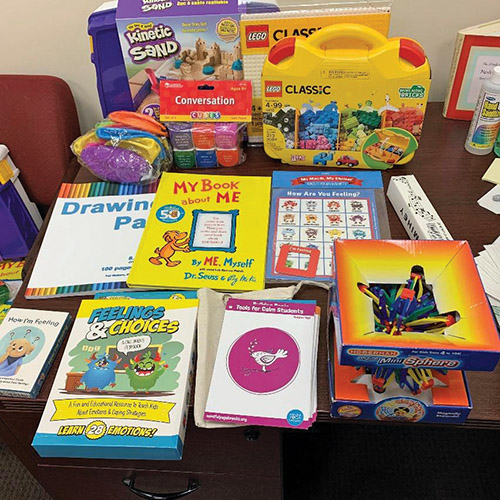

(Courtesy of JFS MetroWest) While the preferred place of work would be in its counseling offices and playrooms, Jewish Family Service of MetroWest NJ (JFS) has become creative and resourceful while working from home.
During this COVID-19 pandemic, when in-person therapy is not possible, JFS clinicians have been working with child clients remotely, utilizing teleplay therapy. Teleplay therapy is a form of virtual play therapy which allows children and families to maintain their relationships with their clinician and continue working on treatment goals while giving a sense of normalcy in this everchanging outside world. Play is the primary tool of communication for a child, so it is important that JFS modify its therapy “tool box” in the time of COVID-19 to incorporate play and art into its virtual sessions. Through teleplay therapy, a child can identify and express their feelings, explore relationships, describe experiences and build and maintain relationships with their clinician, family members and peers.
JFS wishes to thank HealthCare Foundation of New Jersey for providing the funding for play therapy supplies for clinicians to use at home. Some of the items in the clinicians’ “teleplay therapy kits” include LEGOs, kinetic sand, feelings identification cards, conversation cubes, emoji balls, card games, books, breathing balls, fidget toys and art supplies.
Storytelling and reading books are great for teleplay therapy. Clinicians can read the child a picture book and engage the child in telling a story utilizing puppets, dolls, stuffed animals or other props within the home. Board games and card games are also great ways to engage children in teleplay therapy. These games can be read aloud, acted out or played together to encourage connection, cooperation, physical activity and laughter. Brightly colored feelings faces and charts are other easy and great tools to use virtually. Clinicians can hold up a feelings face and talk about a time when you felt happy, how you felt when you did something new, feelings about school, missing friends, etc. Mindfulness and relaxation techniques are also important skills that can be taught and practiced virtually with children. Breathing balls, bubble timers and kinetic sand encourage soothing and calming through the act of play.
Marianne McCrone, MS, NCC, LPC, program coordinator, JFS Child & Adolescent Services, stated: “Transitioning to teleplay therapy has been a challenge for us as clinicians, and for the children we provide therapy services for; we miss being together face to face in an office space. However, we are able to creatively use art, games and toys to help our clients identify and express their feelings in a developmentally appropriate manner. As you can see from the drawing from one of my clients – a 7 year old girl drew this when she was talking about being sad and angry and happy and seemed very confused how she could feel all of these different feelings at once. I asked if she wanted to draw about it since she was having a hard time talking and making sense of it. She called it ‘my home of feelings.’”
�













